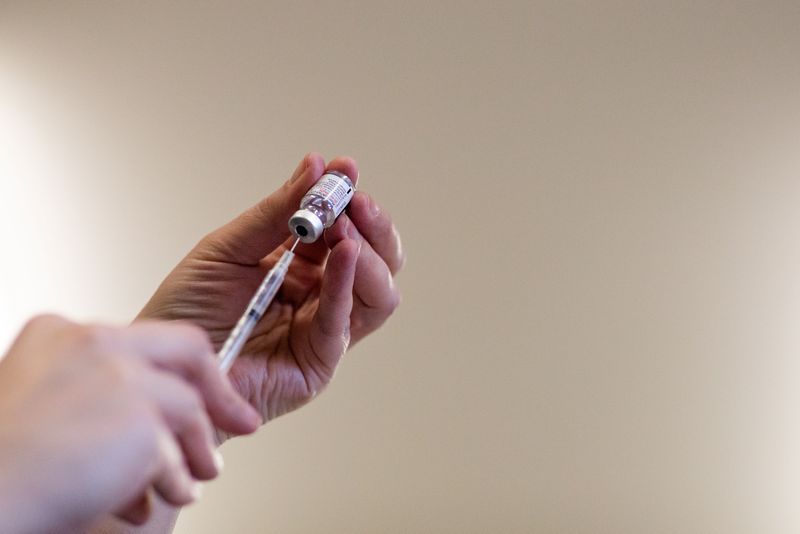By Nancy Lapid
(Reuters) - The following is a summary of some recent studies on COVID-19. They include research that warrants further study to corroborate the findings and that has yet to be certified by peer review.
Post-infection vaccination may reduce long COVID
Vaccination after infection with SARS-CoV-2 may contribute to a reduction in the burden of long COVID symptoms, a new study suggests.
Researchers tracked 6,729 volunteers ages 18 to 69, who got two shots of either AstraZeneca (NASDAQ:AZN)'s viral vector vaccine or an mRNA vaccine from Pfizer/BioNTech or Moderna (NASDAQ:MRNA) after recovering from an infection with the coronavirus and who reported long COVID symptoms of any severity at least once between February and September 2021. The odds of reporting long COVID - symptoms lasting at least 12 weeks - fell by an average of 13% after a first vaccine dose, the researchers reported on Wednesday in The BMJ. The second dose, given 12 weeks after the first, was associated with a further 9% decrease in the odds of long COVID that persisted for at least 9 weeks, on average, the researchers said. The odds of reporting long COVID severe enough to result in functional impairment were similarly reduced, researchers reported. Outcomes were similar regardless of vaccine type, interval from infection to first vaccine dose, underlying health status, or severity of COVID-19. However, the study was not designed to detect such differences, nor can it definitively prove that vaccines lower the odds of long COVID.
"Further research is required to evaluate the long-term relationship between vaccination and long COVID, in particular the impact of the Omicron variant," which emerged after this study ended, the researchers said.
Desktop "air curtains" may deflect virus particles
When people cannot maintain a safe distance to avoid the spread of COVID-19, a newly designed desktop "air curtain" can block aerosols in exhaled air, researchers found.
Air-curtains - artificially created streams of moving air - are often used to protect patients in operating rooms. At Nagoya University in Japan, researchers tested their new desktop device by simulating a blood collection booth in which a lab technician is close to the patient. Aerosol particles blown toward the curtain "were observed to bend abruptly toward (a) suction port" without passing through the air curtain, they reported on Tuesday in AIP Advances. Even putting an arm through the air curtain did not break the flow or reduce its effectiveness, they said. A high-efficiency particulate air (HEPA) filter can be installed inside the suction port, they added.
If further testing in real-life conditions confirms the effectiveness of the system, it could "be useful as an indirect barrier not only in the medical field but also in situations where sufficient physical distance cannot be maintained, such as at the reception counter," the researchers said.
Antacid aids in COVID-19 by helping limit inflammation
Researchers have discovered just how the antacid famotidine, commonly sold as Pepcid by a Johnson & Johnson (NYSE:JNJ) unit, was able to help alleviate COVID-19 symptoms in clinical trials.
In studies in mice, they found that famotidine stimulates the vagus nerve, which controls the immune system and other involuntary body functions. When the vagus nerve is stimulated, it can send out signals to suppress severe immune reactions - so-called cytokine storms - in which high levels of inflammatory proteins are released into the blood too quickly. When famotidine was administered to the mice, it significantly reduced levels of inflammatory proteins in the blood and spleen and improved survival. But when the vagus nerve was cut, famotidine no longer stopped the cytokine storms, according to a report published on Monday in Molecular Medicine. The data "point to a role of the vagus nerve inflammatory reflex in suppressing cytokine storm during COVID-19," coauthor Dr. Kevin Tracey of The Feinstein Institutes for Medical Research in Manhasset, New York, said in a statement.
Direct electrical stimulation of the vagus nerve is known to improve a variety of diseases. "Famotidine, a well-tolerated oral drug, could offer an additional method" of activating the vagus nerve to reduce inflammatory protein generation and resulting tissue damage in COVID-19 and other diseases, the researchers concluded.
Click for a Reuters graphic on vaccines in development.
